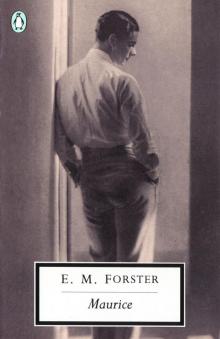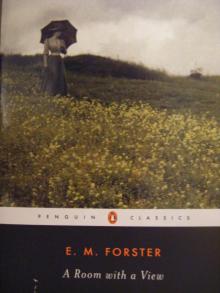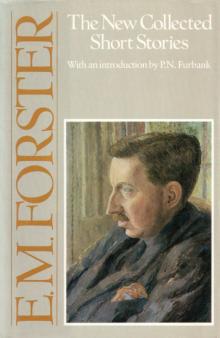- Home
- E. M. Forster
Howards End Page 9
Howards End Read online
Page 9
“Yes, quite.”
“Then I will stay. I’m enjoying this.”
Dolly’s photograph was now examined. It was signed “For dear Mims,” which Mrs. Wilcox interpreted as “the name she and Charles had settled that she should call me.” Dolly looked silly, and had one of those triangular faces that so often prove attractive to a robust man. She was very pretty. From her Margaret passed to Charles, whose features prevailed opposite. She speculated on the forces that had drawn the two together till God parted them. She found time to hope that they would be happy.
“They have gone to Naples for their honeymoon.”
“Lucky people!”
“I can hardly imagine Charles in Italy.”
“Doesn’t he care for travelling?”
“He likes travel, but he does see through foreigners so. What he enjoys most is a motor tour in England, and I think that would have carried the day if the weather had not been so abominable. His father gave him a car of his own for a wedding present, which for the present is being stored at Howards End.”
“I suppose you have a garage there?”
“Yes. My husband built a little one only last month, to the west of the house, not far from the wych-elm, in what used to be the paddock for the pony. ”
The last words had an indescribable ring about them.
“Where’s the pony gone?” asked Margaret after a pause.
“The pony? Oh, dead, ever so long ago.”
“The wych-elm I remember. Helen spoke of it as a very splendid tree.”
“It is the finest wych-elm in Hertfordshire. Did your sister tell you about the teeth?”
“No.”
“Oh, it might interest you. There are pigs’ teeth stuck into the trunk, about four feet from the ground. The country people put them in long ago, and they think that if they chew a piece of the bark, it will cure the toothache. The teeth are almost grown over now, and no one comes to the tree.”
“I should. I love folklore and all festering superstitions.”
“Do you think that the tree really did cure toothache, if one believed in it?”
“Of course it did. It would cure anything—once.”
“Certainly I remember cases—you see, I lived at Howards End long, long before Mr. Wilcox knew it. I was born there.”
The conversation again shifted. At the time it seemed little more than aimless chatter. She was interested when her hostess explained that Howards End was her own property. She was bored when too minute an account was given of the Fussell family, of the anxieties of Charles concerning Naples, of the movements of Mr. Wilcox and Evie, who were motoring in Yorkshire. Margaret could not bear being bored. She grew inattentive, played with the photograph frame, dropped it, smashed Dolly’s glass, apologized, was pardoned, cut her finger thereon, was pitied, and finally said she must be going—there was all the housekeeping to do, and she had to interview Tibby’s riding-master.
Then the curious note was struck again.
“Good-bye, Miss Schlegel, good-bye. Thank you for coming. You have cheered me up.”
“I’m so glad!”
“I—I wonder whether you ever think about yourself.”
“I think of nothing else,” said Margaret, blushing, but letting her hand remain in that of the invalid.
“I wonder. I wondered at Heidelberg.”
“I’m sure!”
“I almost think—”
“Yes?” asked Margaret, for there was a long pause—a pause that was somehow akin to the flicker of the fire, the quiver of the reading-lamp upon their hands, the white blur from the window; a pause of shifting and eternal shadows.
“I almost think you forget you’re a girl.”
Margaret was startled and a little annoyed. “I’m twenty-nine,” she remarked. “That’s not so wildly girlish.”
Mrs. Wilcox smiled.
“What makes you say that? Do you mean that I have been gauche and rude?”
A shake of the head. “I only meant that I am fifty-one, and that to me both of you—Read it all in some book or other; I cannot put things clearly.”
“Oh, I’ve got it—inexperience. I’m no better than Helen, you mean, and yet I presume to advise her.”
“Yes. You have got it. Inexperience is the word.”
“Inexperience,” repeated Margaret, in serious yet buoyant tones. “Of course, I have everything to learn—absolutely everything—just as much as Helen. Life’s very difficult and full of surprises. At all events, I’ve got as far as that. To be humble and kind, to go straight ahead, to love people rather than pity them, to remember the submerged—well, one can’t do all these things at once, worse luck, because they’re so contradictory. It’s then that proportion comes in—to live by proportion. Don’t begin with proportion. Only prigs do that. Let proportion come in as a last resource, when the better things have failed, and a deadlock—Gracious me, I’ve started preaching!”
“Indeed, you put the difficulties of life splendidly,” said Mrs. Wilcox, withdrawing her hand into the deeper shadows. “It is just what I should have liked to say about them myself.”
Chapter IX
Mrs. Wilcox cannot be accused of giving Margaret much information about life. And Margaret, on the other hand, has made a fair show of modesty, and has pretended to an inexperience that she certainly did not feel. She had kept house for over ten years; she had entertained, almost with distinction; she had brought up a charming sister, and was bringing up a brother. Surely, if experience is attainable, she had attained it.
Yet the little luncheon-party that she gave in Mrs. Wilcox’s honour was not a success. The new friend did not blend with the “one or two delightful people” who had been asked to meet her, and the atmosphere was one of polite bewilderment. Her tastes were simple, her knowledge of culture slight, and she was not interested in the New English Art Club, nor in the dividing-line between Journalism and Literature, which was started as a conversational hare. The delightful people darted after it with cries of joy, Margaret leading them, and not till the meal was half over did they realize that the principal guest had taken no part in the chase. There was no common topic. Mrs. Wilcox, whose life had been spent in the service of husband and sons, had little to say to strangers who had never shared it, and whose age was half her own. Clever talk alarmed her, and withered her delicate imaginings; it was the social counterpart of a motor-car, all jerks, and she was a wisp of hay, a flower. Twice she deplored the weather, twice criticized the train service on the Great Northern Railway. They vigorously assented, and rushed on, and when she inquired whether there was any news of Helen, her hostess was too much occupied in placing Rothenstein to answer. The question was repeated: “I hope that your sister is safe in Germany by now.” Margaret checked herself and said: “Yes, thank you; I heard on Tuesday.” But the demon of vociferation was in her, and the next moment she was off again.
“Only on Tuesday, for they live right away at Stettin: Did you ever know any one living at Stettin?”
“Never,” said Mrs. Wilcox gravely, while her neighbour, a young man low down in the Education Office, began to discuss what people who lived at Stettin ought to look like. Was there such a thing as Stettininity? Margaret swept on.
“People at Stettin drop things into boats out of overhanging warehouses. At least, our cousins do, but aren’t particularly rich. The town isn’t interesting, except for a clock that rolls its eyes, and the view of the Oder, which truly is something special. Oh, Mrs. Wilcox, you would love the Oder! The river, or rather rivers—there seem to be dozens of them—are intense blue, and the plain they run through an intensest green.”
“Indeed! That sounds like a most beautiful view, Miss Schlegel.”
“So I say, but Helen, who will muddle things, says no, it’s like music. The course of the Oder is to be like music. It’s obliged to remind her of a symphonic poem. The part by the landing-stage is in B minor, if I remember rightly, but lower down things get extremely mixed. There is a slod
gy theme in several keys at once, meaning mud-banks, and another for the navigable canal, and the exit into the Baltic is in C sharp major, pianissimo.”
“What do the overhanging warehouses make of that?” asked the man, laughing.
“They make a great deal of it,” replied Margaret, unexpectedly rushing off on a new track. “I think it’s affectation to compare the Oder to music, and so do you, but the overhanging warehouses of Stettin take beauty seriously, which we don‘t, and the average Englishman doesn’t, and despises all who do. Now don’t say, ‘Germans have no taste,’ or I shall scream. They haven’t. But—but—such a tremendous but!—they take poetry seriously. They do take poetry seriously.”
“Is anything gained by that?”
“Yes, yes. The German is always on the lookout for beauty. He may miss it through stupidity, or misinterpret it, but he is always asking beauty to enter his life, and I believe that in the end it will come. At Heidelberg I met a fat veterinary surgeon whose voice broke with sobs as he repeated some mawkish poetry. So easy for me to laugh—I, who never repeat poetry good, or bad, and cannot remember one fragment of verse to thrill myself with. My blood boils—well, I’m half German, so put it down to patriotism—when I listen to the tasteful contempt of the average islander for things Teutonic, whether they’re Böcklin or my veterinary surgeon. ‘Oh, Böcklin,’ they say; ‘he strains after beauty, he peoples Nature with gods too consciously.’ Of course Böcklin strains, because he wants something—beauty and all the other intangible gifts that are floating about the world. So his landscapes don’t come off, and Leader’s do.”
“I am not sure that I agree. Do you?” said he, turning to Mrs. Wilcox.
She replied: “I think Miss Schlegel puts everything splendidly”; and a chill fell on the conversation.
“Oh, Mrs. Wilcox, say something nicer than that. It’s such a snub to be told you put things splendidly.”
“I do not mean it as a snub. Your last speech interested me so much. Generally people do not seem quite to like Germany. I have long wanted to hear what is said on the other side.”
“The other side? Then you do disagree. Oh, good! Give us your side.”
“I have no side. But my husband”—her voice softened, the chill increased—“has very little faith in the Continent, and our children have all taken after him.”
“On what grounds? Do they feel that the Continent is in bad form?”
Mrs. Wilcox had no idea; she paid little attention to grounds. She was not intellectual, nor even alert, and it was odd that, all the same, she should give the idea of greatness. Margaret, zig-zagging with her friends over Thought and Art, was conscious of a personality that transcended their own and dwarfed their activities. There was no bitterness in Mrs. Wilcox; there was not even criticism; she was lovable, and no ungracious or uncharitable word had passed her lips. Yet she and daily life were out of focus: one or the other must show blurred. And at lunch she seemed more out of focus than usual, and nearer the line that divides daily life from a life that may be of greater importance.
“You will admit, though, that the Continent—it seems silly to speak of ‘the Continent,’ but really it is all more like itself than any part of it is like England. England is unique. Do have another jelly first. I was going to say that the Continent, for good or for evil, is interested in ideas. Its literature and art have what one might call the kink of the unseen about them, and this persists even through decadence and affectation. There is more liberty of action in England, but for liberty of thought go to bureaucratic Prussia. People will there discuss with humility vital questions that we here think ourselves too good to touch with tongs.”
“I do not want to go to Prussia,” said Mrs. Wilcox—“not even to see that interesting view that you were describing. And for discussing with humility I am too old. We never discuss anything at Howards End.”
“Then you ought to!” said Margaret. “Discussion keeps a house alive. It cannot stand by bricks and mortar alone.”
“It cannot stand without them,” said Mrs. Wilcox, unexpectedly catching on to the thought, and rousing, for the first and last time, a faint hope in the breasts of the delightful people. “It cannot stand without them, and I sometimes think—But I cannot expect your generation to agree, for even my daughter disagrees with me here.”
“Never mind us or her. Do say!”
“I sometimes think that it is wiser to leave action and discussion to men.”
There was a little silence.
“One admits that the arguments against the suffrage are extraordinarily strong,” said a girl opposite, leaning forward and crumbling her bread.
“Are they? I never follow any arguments. I am only too thankful not to have a vote myself.”
“We didn’t mean the vote, though, did we?” supplied Margaret. “Aren’t we differing on something much wider, Mrs. Wilcox? Whether women are to remain what they have been since the dawn of history; or whether, since men have moved forward so far, they too may move forward a little now. I say they may. I would even admit a biological change.”
“I don’t know, I don’t know.”
“I must be getting back to my overhanging warehouse,” said the man. “They’ve turned disgracefully strict.”
Mrs. Wilcox also rose.
“Oh, but come upstairs for a little. Miss Quested plays. Do you like MacDowell? Do you mind him only having two noises? If you must really go, I’ll see you out. Won’t you even have coffee?”
They left the dining-room, closing the door behind them, and as Mrs. Wilcox buttoned up her jacket, she said: “What an interesting life you all lead in London!”
“No, we don‘t,” said Margaret, with a sudden revulsion. “We lead the lives of gibbering monkeys, Mrs. Wilcox—really—We have something quiet and stable at the bottom. We really have. All my friends have. Don’t pretend you enjoyed lunch, for you loathed it, but forgive me by coming again, alone, or by asking me to you.”
“I am used to young people,” said Mrs. Wilcox, and with each word she spoke, the outlines of known things grew dim. “I hear a great deal of chatter at home, for we, like you, entertain a great deal. With us it is more sport and politics, but—I enjoyed my lunch very much, Miss Schlegel, dear, and am not pretending, and only wish I could have joined in more. For one thing, I’m not particularly well just today. For another, you younger people move so quickly that it dazes me. Charles is the same, Dolly the same. But we are all in the same boat, old and young. I never forget that.”
They were silent for a moment. Then, with a new-born emotion, they shook hands. The conversation ceased suddenly when Margaret re-entered the dining-room: her friends had been talking over her new friend, and had dismissed her as uninteresting.
Chapter X
Several days passed.
Was Mrs. Wilcox one of the unsatisfactory people—there are many of them—who dangle intimacy and then withdraw it? They evoke our interests and affections, and keep the life of the spirit dawdling round them. Then they withdraw. When physical passion is involved, there is a definite name for such behaviour—flirting—and if carried far enough, it is punishable by law. But no law—not public opinion, even—punishes those who coquette with friendship, though the dull ache that they inflict, the sense of misdirected effort and exhaustion, may be as intolerable. Was she one of these?
Margaret feared so at first, for, with a Londoner’s impatience, she wanted everything to be settled up immediately. She mis trusted the periods of quiet that are essential to true growth. Desiring to book Mrs. Wilcox as a friend, she pressed on the ceremony, pencil, as it were, in hand, pressing the more because the rest of the family were away and the opportunity seemed favourable. But the elder woman would not be hurried. She refused to fit in with the Wickham Place set, or to re-open discussion of Helen and Paul, whom Margaret would have utilized as a short-cut. She took her time, or perhaps let time take her, and when the crisis did come all was ready.
The crisis opened with a me
ssage: would Miss Schlegel come shopping? Christmas was nearing, and Mrs. Wilcox felt behindhand with the presents. She had taken some more days in bed, and must make up for lost time. Margaret accepted, and at eleven o‘clock one cheerless morning they started out in a brougham.
“First of all,” began Margaret, “we must make a list and tick off the people’s names. My aunt always does, and this fog may thicken up any moment. Have you any ideas?”
“I thought we would go to Harrod’s or the Haymarket Stores,” said Mrs. Wilcox rather hopelessly. “Everything is sure to be there. I am not a good shopper. The din is so confusing, and your aunt is quite right—one ought to make a list. Take my notebook, then, and write your own name at the top of the page.”
“Oh, hooray!” said Margaret, writing it. “How very kind of you to start with me!” But she did not want to receive anything expensive. Their acquaintance was singular rather than intimate, and she divined that the Wilcox clan would resent any expenditure on outsiders; the more compact families do. She did not want to be thought a second Helen, who would snatch presents since she could not snatch young men, nor to be exposed, like a second Aunt Juley, to the insults of Charles. A certain austerity of demeanour was best, and she added: “I don’t really want a Yuletide gift, though. In fact, I’d rather not.”
“Why?”
“Because I’ve odd ideas about Christmas. Because I have all that money can buy. I want more people, but no more things.”
“I should like to give you something worth your acquaintance, Miss Schlegel, in memory of your kindness to me during my lonely fortnight. It has so happened that I have been left alone, and you have stopped me from brooding. I am too apt to brood. ”
“If that is so,” said Margaret, “if I have happened to be of use to you, which I didn’t know, you cannot pay me back with anything tangible.”
“I suppose not, but one would like to. Perhaps I shall think of something as we go about.”
Her name remained at the head of the list, but nothing was written opposite it. They drove from shop to shop. The air was white, and when they alighted it tasted like cold pennies. At times they passed through a clot of grey. Mrs. Wilcox’s vitality was low that morning, and it was Margaret who decided on a horse for this little girl, a golliwog for that, for the rector’s wife a copper warming-tray. “We always give the servants money.” “Yes, do you, yes, much easier,” replied Margaret, but felt the grotesque impact of the unseen upon the seen, and saw issuing from a forgotten manger at Bethlehem this torrent of coins and toys. Vulgarity reigned. Public-houses, besides their usual exhortation against temperance reform, invited men to “Join our Christmas goose club”—one bottle of gin, etc., or two, according to subscription. A poster of a woman in tights heralded the Christmas pantomime, and little red devils, who had come in again that year, were prevalent upon the Christmas-cards. Margaret was no morbid idealist. She did not wish this spate of business and self-advertisement checked. It was only the occasion of it that struck her with amazement annually. How many of these vacillating shoppers and tired shop-assistants realized that it was a divine event that drew them together? She realized it, though standing outside in the matter. She was not a Christian in the accepted sense; she did not believe that God had ever worked among us as a young artisan. These people, or most of them, believed it, and if pressed, would affirm it in words. But the visible signs of their belief were Regent Street or Drury Lane, a little mud displaced, a little money spent, a little food cooked, eaten, and forgotten. Inadequate. But in public who shall express the unseen adequately? It is private life that holds out the mirror to infinity; personal intercourse, and that alone, that ever hints at a personality beyond our daily vision.

 The Celestial Omnibus and Other Stories
The Celestial Omnibus and Other Stories Maurice
Maurice The Longest Journey
The Longest Journey Howards End
Howards End A Room with a View
A Room with a View The New Collected Short Stories
The New Collected Short Stories A Passage to India
A Passage to India Where Angels Fear to Tread
Where Angels Fear to Tread Works of E M Forster
Works of E M Forster Selected Stories
Selected Stories The Machine Stops
The Machine Stops Aspects of the Novel
Aspects of the Novel